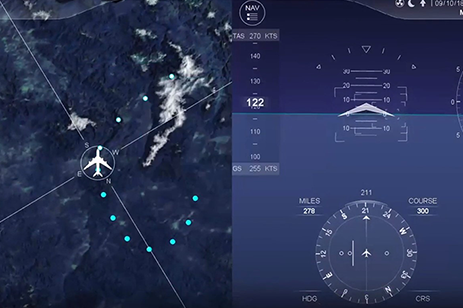
Wind River, Ansys, CoreAVI, Curtiss-Wright, and RTI collaborated to create a solution stack that enables a digital cockpit flight display with touchscreen capabilities demonstration for Future Airborne Capability Environment (FACE™). Using the Modular Open Systems Architecture (MOSA), Open Architecture (OA), and Integrated Modular Avionics (IMA), FACE supports a robust architecture for enabling software development. This video demonstrates how the companies' collaboration reduces customer risk and speeds time to market in an avionics system.
Transcript
Digital Cockpit Flight Display Demonstration: The Open Group Future Airborne Capability Environment (FACE™) Solution
Building a Primary Flight Display Solution for FACE
Wind River, Ansys, CoreAVI, Curtiss-Wright and RTI have collaborated to create a solution stack that enables a digital cockpit flight display with touchscreen capabilities for a FACE solution. FACE is an open standard that is required by defense systems to provide a standard for interface interoperability.
On-screen image shows
- Ansys SCADE Mulit-Touch Cockpit Display
- RTI TSS with Connext® DDS Micro
- CoreAVI OpenGL SC2
- Curtiss-Wright V3-152 single board computer (SBC) and V3-717 graphics module
- Wind River VxWorks 653 Cert 3.0.1.1 mulitcore safety platform
Wind River VxWorks 653 Cert 3.0.1.1 Multicore Safety Platform
- DO-178C DAL A Certification to CAST-32A
- Supports ARINC 653 APEX, FACE, POSIX, & VxWorks API
- Supports multiple DALs on MCP
- Type 1 Hypervisor with heterogenous Guest OS support
- ARINC 653 configuration and enforcement
- Role-based development per DO-297
Curtiss-Wright's Trusted, Proven Hardware Provides the Foundation for this Demo
- The V3-152 DAL A-certifiable single board computer for high-integrity, deterministic processing and trusted computing protections
- The V3-717 DAL high-performance graphics processing module
- A rugged, conduction-cooled chassis
Ansys SCADE Display
A specialized tool for modelling HMI. Fully equipped to design, test and generate code for safety critical embedded displays.
- Graphical prototyping and design
- HMI behavioral logic design
- HMI testing with automated image comparison
- Certification for safety standards
CoreAVI's ArgusCORE™ SC2
OpenGL graphics driver on AMD's Embedded Radeon™ E8860 GPU. Built for safety-critical airborne applications, ArguCore SC2
- Enables best GPU performance
- Achieves the highest levels of safety certifications
- Has scalable power and performance management
- Supports a programmable graphics rendering pipeline
- Is ideal for multi-core applications
RTI TSS with Connext DDS Micro
Real-Time Innovations (RTI) solutions provide the software connectivity framework to make complex, distributed systems work as one
- Open standards-based application and system interoperability
- First certified-conformant FACE Transport Services Segment (TSS)
- Commercial RTCA DO-178C DAL A safety certification evidence
- Over 1,300 global aerospace and defense design wins
FACE Integrated Flight Display Demonstration
On the left is the Primary Flight Display.
Screen settings pop-up with Day and Night modes.
On the right is the multifunction map/autopilot display.
Press on Menu Area to show it.
The area will hide automatically after a few seconds.
Keep pressing on screen to activate swipe mode.
Position can be switched with a finger swipe.
The NAV/HIS toggle button shows the Navigation Status indicators or the Horizontal Situation indicator.
Press space bar on the keyboard to show/hide warnings in the Warning Area.
Attitude direction indicator – ADI
Horizontal speed indicator
Vertical speed indicator
The validate button activates the autopilot. In the autopilot layer, the pilot targets:
- Horizontal speed
- Heading
- Altitude
Map layer
Pressing the "Autopilot" icon toggles between the autopilot layer and the map layer.
Waypoints
Contact these technology leaders to get further infromation:
- Ansys
- Curtiss-Wright
- CoreAVI
- RTI
- Wind River